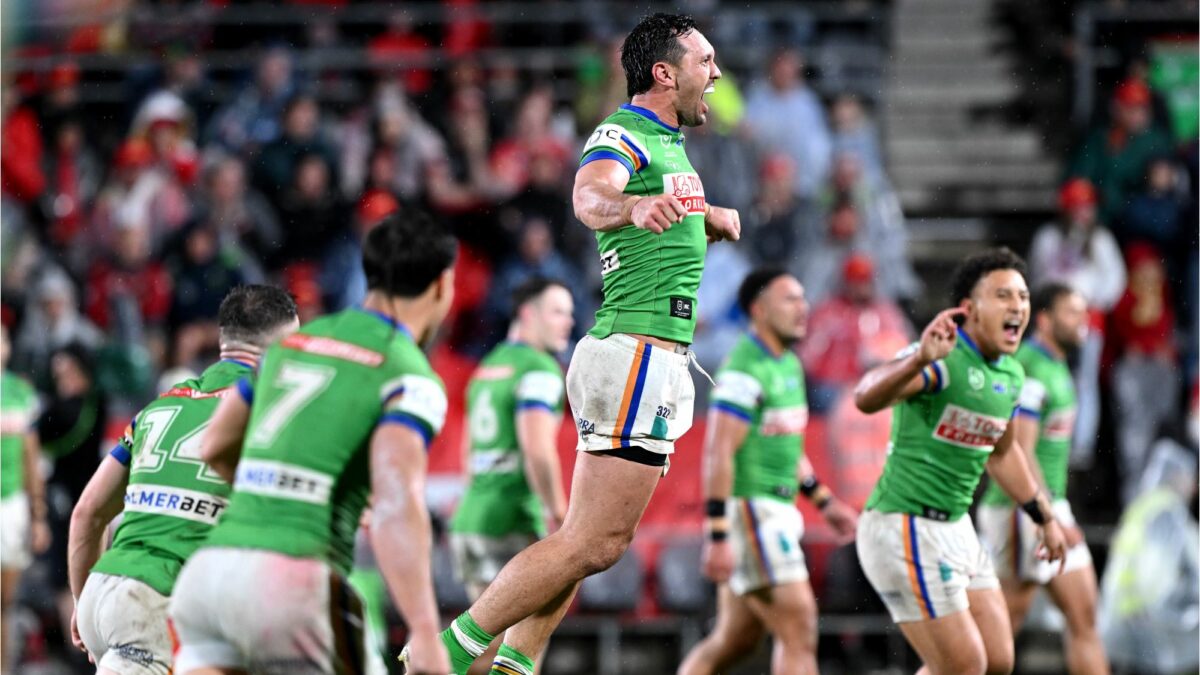Following Round 13’s NRL match between the Dolphins and the Raiders, the same frustrations that crop up every few rounds in our game came roaring back.
Since 2003, NRL’s golden point rule has ignited passionate debate among fans, players, coaches, and analysts. Some celebrate the drama and finality it brings, introducing a desperate and often controversial finish. Others, like myself, are tired of its mundane and predictable nature; undermining the work and sacrifice made over the previous 80 minutes.

Jordan Rapana of the Raiders celebrates after kicking the winning field goal in golden point. (Photo by Bradley Kanaris/Getty Images)
The Case Against Golden Point
Golden Point distorts the outcome of games. It rewards a team for a single play and punishes the other for a minor lapse. The sudden-death nature removes the flow of regular-time gameplay and replaces it with a less strategic and foreseeable snoozefest. This is often frustrating for those fans who feel that 80 minutes of football should determine the result, rather than a predictable run of events like we watched last night.
Team A kicks off, team B goes through five one-off-the-ruck runners, Team B attempts a drop-goal, misses. Team A team gets 7 tackles from the 20-metre line, repeat. Due to this inevitable process, here are four alternatives I believe are worth a discussion.
The draw
What is so wrong with a humble draw? This way both teams leave with something for their efforts over 80 minutes, evidence to prove that no team was superior or inferior. Backers of this option argue it maintains the integrity of the game, where the outcome is a fair reflection of the game’s entirety.
Draws also add a strategic element. With points differential having reduced importance, teams may approach their run home or a soft run of games differently. Also, with teams tied heading into the last five or ten minutes of regular time, we get a glimpse of golden point anyway, with teams jostling for prime drop-goal position and unwilling to take further risks to score a try.
If the powerbrokers are so concerned about finding a result, these next three options may hold some merit.
Regulation Extra Time
Much like association football, play an extra ten minutes, with the team leading after this period declared the winner. This option would encourage more traditional gameplay and systems to stay in place, with a balance of attack, defense, forwards, and backs to win their team the game, instead of the standard forwards rolling upfield into a drop goal. This would lead to a more satisfying conclusion where the better-performing side over the 10 minutes secures the victory.
Golden Try
Another intriguing proposition is the golden try. Much like golden point but requires a team to score a try to win, rather than just a field goal. Again, this method would ensure the chocolates go to the team that can slowly break down a defense or stay true to their systems to break through a tired line.
Reduce Players
Lastly, an unconventional but potentially exciting alternative is to reduce the number of players on the field. Think rugby sevens. By removing players, the game would open up, increasing the chances of tries being scored; the exact reason why we watch the game. This approach would lead to more engaging play, as the reduced numbers would emphasize speed and skill. More space, and therefore more opportunities would appear, likely leading to a more decisive and thrilling conclusion.
While designed to create excitement, the golden point rule in the NRL has sparked significant debate about its fairness and impact on the game’s integrity and watchability.
Each proposed alternative — whether allowing draws, playing regulation extra time, implementing a golden try, or reducing players — offers a unique way to address the predictability of the current system. The challenge lies in balancing the perceived need for a decisive outcome with the desire to maintain the true way the sport is meant to be played.
As the debate continues, it is clear that any change will need to carefully consider the values and traditions that make rugby league the greatest game of all; no easy feat. The future of how tied games are resolved in the NRL remains uncertain, but what is certain is the passion it inspires in all those who love the game.
